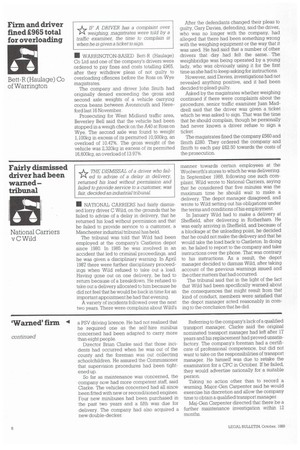THE DISMISSAL of a driver who fail ed to advise
Page 154

If you've noticed an error in this article please click here to report it so we can fix it.
of a delay in delivery, returned his load without permission and failed to provide service to a customer, was fair, decided an industrial tribunal.
II NATIONAL CARRIERS had fairly dismissed lorry driver C Wild, on the grounds that he failed to advise of a delay in delivery, that he returned his load without permission and that he failed to provide service to a customer, a Manchester industrial tribunal has held.
The tribunal was told that Wild had been employed at the company's Castleton depot since 1980. In 1985 he was involved in an accident that led to criminal proceedings, and he was given a disciplinary warning. In April 1987 there were further disciplinary proceedings when Wild refused to take out a load. Having gone out on one delivery, he had to return because of a breakdown. He refused to take out a delivery allocated to him because he did not feel that he would be back in time for an important appointment he had that evening.
A variety of incidents followed over the next two years. There were complains about Wild's manner towards certain employees at the Woolworth's stores to which he was delivering. In September 1988, following one such complaint, Wild wrote to National Carriers, saying that he considered that five minutes was the maximum time he should wait to make a delivery. The depot manager disagreed, and wrote to Wild setting out his obligations under the terms and conditions of his employment.
In January Wild had to make a delivery at Sheffield, after delivering in Rotherham. He was early arriving in Sheffield, and because of a blockage at the unloading point, he decided that he could not make the delivery and that he would take the load back to Castleton. In doing so, he failed to report to the company and take instructions over the phone. That was contrary to his instructions. As a result, the depot manager decided to dismiss Wild, after taking account of the previous warnings issued and the other matters that had occurred.
The tribunal said that in the light of the fact that Wild had been specifically warned about the consequences that might result from that kind of conduct, members were satisfied that the depot manager acted reasonably in coming to the conclusion that he did.




























































































































































